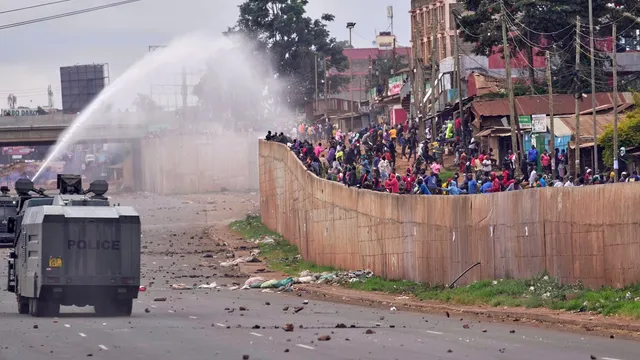
Kenya police clash with protesters on anniversary of pro-democracy march
2025-07-07 18:30- Police enforced strict roadblocks and closures across Nairobi leading to the capital ahead of the planned protests.
- Protesters expressed outrage over police brutality and government corruption, relating their grievances to the 35th anniversary of pro-democracy demonstrations.
- The situation in Kenya is indicative of rising tensions against government practices and a historical demand for accountability and reform.
Express your sentiment!
Insights
In Kenya, significant protests took place on July 7, 2025, marking the anniversary of a pro-democracy rally that occurred 35 years ago. These protests were met with heavy police presence that blocked major roads leading into Nairobi, resulting in many businesses closing for the day. Law enforcement was actively stopping vehicles and pedestrians from entering the city center, aiming to prevent gatherings. The planned demonstrations were fueled by public outrage against police brutality, poor governance, and widespread allegations of corruption that have plagued the government led by President William Ruto. The demonstrations commemorated the historic 'Saba Saba' day from 35 years ago, a pivotal moment that marked Kenya’s transition toward a multiparty democracy in the early 1990s. This year's protests drew particular attention due to recent events including the shooting of an unarmed street vendor and the alleged police abuse resulting in civilian deaths. Many citizens expressed their frustrations regarding the rising cost of living and the government's apparent inaction regarding persistent corruption within its ranks. As the protests began, many areas around the capital saw gatherings of young Kenyans who were vehemently expressing their dissent. The Interior Minister Kipchumba Murkomen warned that police would deal decisively with any violent protests, reinforcing a strict security environment by barricading key locations such as the Parliament building and the Presidential residence. Reports noted instances where police used prohibited tactics, such as firing tear gas into crowds and employing water cannons in attempts to disperse protesters. The situation in Kenya has become increasingly volatile, especially in light of several violent episodes in previous months. Incidents such as police accountability failures and the tragic deaths of individuals in custody have intensified calls for reform and accountability in law enforcement. The growing unrest and these modern grievances echo the historical significance of the Saba Saba demonstrations, reflecting a deep-rooted desire for political change and human rights in the face of government resistance. The outcome of such protests remains uncertain, with underlying tensions suggesting that the government's approach to dissent will continue to result in a cycle of protests and crackdowns in the near future.